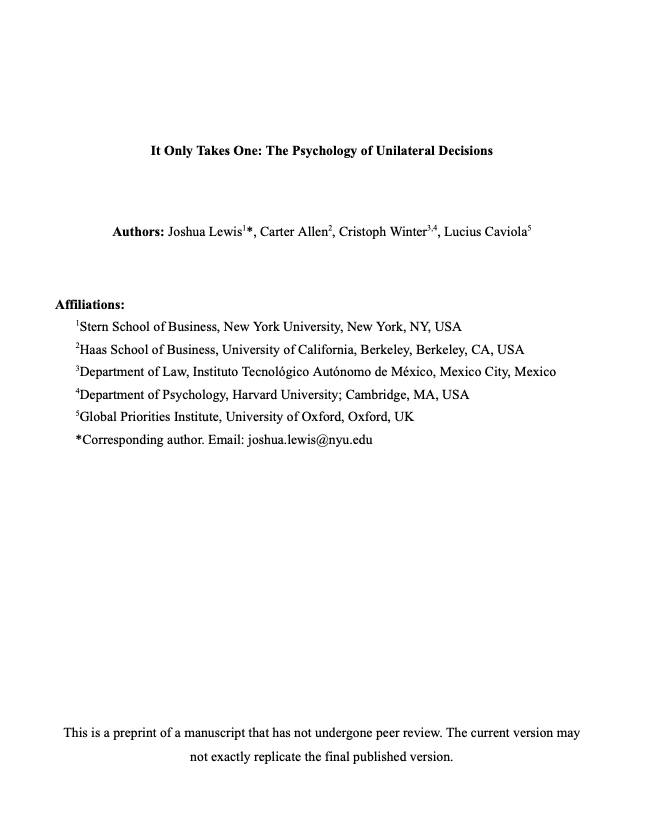It Only Takes One: The Psychology of Unilateral Decisions
Joshua Lewis (New York University), Carter Allen (UC Berkeley), Christoph Winter (ITAM, Harvard University and Institute for Law & AI) and Lucius Caviola (Global Priorities Institute, Oxford University)
GPI Working Paper No. 14-2024
Sometimes, one decision can guarantee that a risky event will happen. For instance, it only took one team of researchers to synthesize and publish the horsepox genome, thus imposing its publication even though other researchers might have refrained for biosecurity reasons. We examine cases where everybody who can impose a given event has the same goal but different information about whether the event furthers that goal. Across 8 experiments (including scenario studies with elected policymakers, doctors, artificial-intelligence researchers, and lawyers and judges and economic games with laypeople, N = 1,518, and 3 supplemental studies, N = 847) people behave suboptimally, balancing two factors. First, people often impose events with expected utility only slightly better than the alternative based on the information available to them, even when others might know more. This approach is insufficiently cautious, leading people to impose too frequently, a situation termed the unilateralist’s curse. Second, counteracting the first factor, people avoid sole responsibility for unexpectedly bad outcomes, sometimes declining to impose seemingly desirable events. The former heuristic typically dominates and people unilaterally impose too often, succumbing to the unilateralist’s curse. But when only few people can impose, who know the stakes are high, responsibility aversion reduces over-imposing.
Other working papers
How should risk and ambiguity affect our charitable giving? – Lara Buchak (Princeton University)
Suppose we want to do the most good we can with a particular sum of money, but we cannot be certain of the consequences of different ways of making use of it. This paper explores how our attitudes towards risk and ambiguity bear on what we should do. It shows that risk-avoidance and ambiguity-aversion can each provide good reason to divide our money between various charitable organizations rather than to give it all to the most promising one…
The structure of critical sets – Walter Bossert (University of Montreal), Susumu Cato (University of Tokyo) and Kohei Kamaga (Sophia University)
The purpose of this paper is to address some ambiguities and misunderstandings that appear in previous studies of population ethics. In particular, we examine the structure of intervals that are employed in assessing the value of adding people to an existing population. Our focus is on critical-band utilitarianism and critical-range utilitarianism, which are commonly-used population theories that employ intervals, and we show that some previously assumed equivalences are not true in general. The possible discrepancies can be…
Existential Risk and Growth – Philip Trammell (Global Priorities Institute and Department of Economics, University of Oxford) and Leopold Aschenbrenner
Technologies may pose existential risks to civilization. Though accelerating technological development may increase the risk of anthropogenic existential catastrophe per period in the short run, two considerations suggest that a sector-neutral acceleration decreases the risk that such a catastrophe ever occurs. First, acceleration decreases the time spent at each technology level. Second, since a richer society is willing to sacrifice more for safety, optimal policy can yield an “existential risk Kuznets curve”; acceleration…

